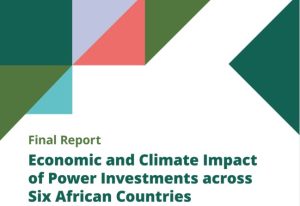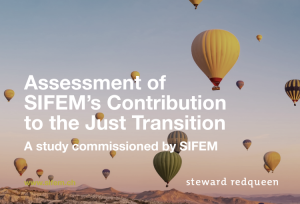Climate Change for Financials: What Really Matters?
Silvia Binet is a Manager with specific expertise on climate change and development in emerging markets. She focuses on developing climate investing strategies for a broad range of clients, including climate finance mechanisms, banks, private equity funds and development financials. She shares some common challenges that she sees banks and investors typically grapple with, and some pointers on how to deal with those challenges.
When it comes to dealing with climate change it is easy for financial institutions to lose sight of what really matters. The number of regulations, standards, and industry commitments is wide and varied, and appears to increase and change constantly.
At Steward Redqueen, we help banks and asset managers navigate this dynamic field and focus on what really matters to them. In our work with these financial institutions, we see three common challenges that many are grappling with across the investment life cycle- from strategy development, to investment decision-making and portfolio management.
1 – Managing trade-offs
Developing a climate strategy does not mean approaching climate action in isolation. While reducing the emissions of greenhouse gases is a key focus, strategies for climate action are meaningful and effective when accounting for trade-offs and synergies with economic development, social justice, gender, resilience, or nature. Ideally, all will go hand in hand, but this in practice is rarely the case.
In our view, while a very focused investment strategy is easier to steer on, the reality is that investors constantly need to consider tensions between multiple impact objectives. Helping our clients understand and manage trade-offs and enabling them to strike the right balance is at the core of our approach to climate and sustainability issues. My colleague Pranav Kalra recently explained this in more detail: read more about our view on the energy transition here.
2 –Making the intangible tangible
Climate-focused investors increasingly need structured, data-driven approaches to inform their decision-making (which deal will bring the highest climate impact returns?). What makes it complex is that crucial aspects such as avoided emissions or improved climate resilience are intangible concepts, which are not always straightforward to quantify. For instance, avoided emissions are quantified as the difference between the emissions of a green solution and those of a related incumbent technology – which means assessing which is the most realistic alternative, or in jargon, a counterfactual scenario.
In our view, when establishing a counterfactual, it is crucial to be consistent and transparent about the underlying assumptions. Despite the available guidance, this process always requires some degree of judgement on which scenario is most likely to materialise, and which approach will provide the most informative results. While different choices can be defensible, ensuring full disclosure on the approach adopted is paramount.
3 – Focusing action
Investors with a climate agenda increasingly dedicate efforts to obtaining more granular portfolio emissions data. But is that the real solution? Often, investee-level data is unreliable, and collecting real-time data can be labour intensive and expensive. Moreover, modelling approaches result in high-level estimates based on many assumptions.
In our view, rather than focusing primarily on enhancing data accuracy, we believe decarbonisation strategies are about identifying the niches where an investor has real leverage to drive change, given the types of financing it provides and its role in the financial sector. These niches can be within its portfolio, or at the broader ecosystem level. With a clear picture of their sphere of influence, investors can develop meaningful decarbonisation strategies and focused emissions measurement efforts.
Do you recognise these challenges and need help overcoming them?
Feel free to reach out, as we will be developing additional guidance and events to share experiences over the next months.
















